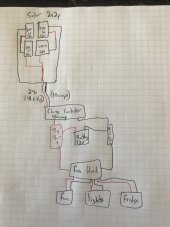dsaint1884
New Member
- Joined
- Jul 8, 2022
- Messages
- 42
I am building a camper van setup and plan to run 4x100w 12v solar panels in 2s2p. This will bring the panels up to 24v with an Voc of 48.6v. (I mention this just because I've heard that 50v DC is where you need to be more concerned about grounding).
Anyway, right now I'm running every negative wire back to the batter/bus bar. I ran duplex wire so everything is run with two wires, the positive to the load, and the negative back to the battery. I have no chassis grounding, I've not grounded the solar panels, or anything else so far. It's all just a big loop trying back to the battery. Right now there is no shore power, DC-DC charge from the alternator or an inverter in the system. If I add AC to the mix I'd ground that system but that's a different animal than DC.
Do I need a chassis ground anywhere in this DC only system for safety? Alternatively, should I just stick to parallel solar panels and the lower voltage so I have less to worry about, if it's a worry at all?
I've not included any fuses or switches in this diagram but this is what it would look like to start as far as the path of all the circuits.
Anyway, right now I'm running every negative wire back to the batter/bus bar. I ran duplex wire so everything is run with two wires, the positive to the load, and the negative back to the battery. I have no chassis grounding, I've not grounded the solar panels, or anything else so far. It's all just a big loop trying back to the battery. Right now there is no shore power, DC-DC charge from the alternator or an inverter in the system. If I add AC to the mix I'd ground that system but that's a different animal than DC.
Do I need a chassis ground anywhere in this DC only system for safety? Alternatively, should I just stick to parallel solar panels and the lower voltage so I have less to worry about, if it's a worry at all?
I've not included any fuses or switches in this diagram but this is what it would look like to start as far as the path of all the circuits.



